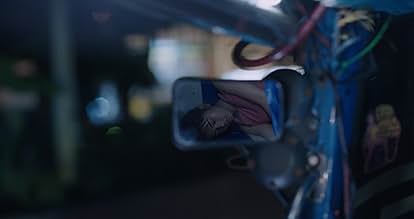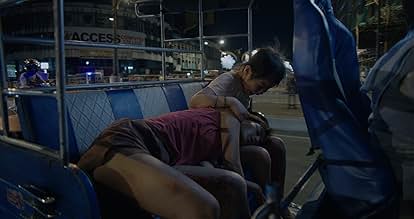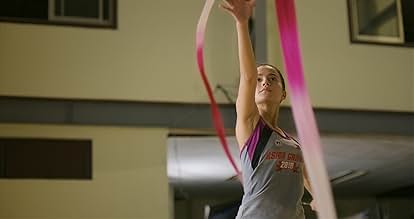It follows a young gymnast who discovers she is pregnant on the week of the national team tryouts. On her way to a seller of illegal abortion drugs, she meets a mysterious girl who eerily ta... Read allIt follows a young gymnast who discovers she is pregnant on the week of the national team tryouts. On her way to a seller of illegal abortion drugs, she meets a mysterious girl who eerily talks and thinks like her.It follows a young gymnast who discovers she is pregnant on the week of the national team tryouts. On her way to a seller of illegal abortion drugs, she meets a mysterious girl who eerily talks and thinks like her.
- Awards
- 1 win & 1 nomination total
- Director
- Writer
- All cast & crew
- Production, box office & more at IMDbPro
Featured reviews
10PL-614
Sunshine is truly an eye-opener. It bravely tackles real issues that so many young adults-and even kids who are just stepping into their teenage years-are silently going through. The film dives deep into the realities of early pregnancy, abortion, and the emotional and social weight that comes with them.
What I really hope is that parents take the time to watch this film. Not just to be aware, but to feel that urgency-the need to guide and talk to their children about these sensitive but important topics. It's a conversation that can't be delayed anymore.
What stood out to me the most was how real and raw everything felt. I didn't leave the cinema feeling happy, but I did feel relieved. I felt the pain, the heartache, and the struggle that Sunshine went through-but I also saw the strength in her journey. The story is complete. It gives you everything from beginning to end, no shortcuts, no sugar-coating.
I loved the film. I honestly want to watch it again-not just for the story, but for the emotions it stirred up and the awareness it brings. This film matters.
What I really hope is that parents take the time to watch this film. Not just to be aware, but to feel that urgency-the need to guide and talk to their children about these sensitive but important topics. It's a conversation that can't be delayed anymore.
What stood out to me the most was how real and raw everything felt. I didn't leave the cinema feeling happy, but I did feel relieved. I felt the pain, the heartache, and the struggle that Sunshine went through-but I also saw the strength in her journey. The story is complete. It gives you everything from beginning to end, no shortcuts, no sugar-coating.
I loved the film. I honestly want to watch it again-not just for the story, but for the emotions it stirred up and the awareness it brings. This film matters.
We watched Sunshine yesterday, July 24, during the block screening at SM Megamall. I had seen the trailer beforehand, so I knew we were in for something bold, something necessary. But I wasn't prepared for how deeply it would sit with me long after the credits rolled.
I didn't cry while watching the film, but once it ended, I found myself overwhelmed. The weight of Sunshine doesn't hit all at once - it lingers, it settles. And it stays.
At its core, Sunshine is the story of a woman taking control of her body in a society that keeps telling her she isn't allowed to. It's not simply about one choice, one moment, or one woman. It's about the collective experience of many Filipinas who navigate a system that consistently fails to hear them.
Antoinette Jadaone's direction doesn't shy away from discomfort. She faces it head-on, inviting the audience to confront the silences we've learned to live with - about abortion, reproductive rights, the stigma around sexuality, and the lack of access to informed sex education in the Philippines.
Sunshine is timely, urgent, and painfully real. It gives voice to the cry of our generation, echoing the need for progressive reforms that protect women and children. The film challenges its viewers not just to empathize, but to act.
As a viewer, I left the cinema not only moved, but also awakened. Sunshine isn't here to entertain. It's here to disturb, to provoke, and to push us into uncomfortable yet necessary conversations.
To my fellow Filipinos: let's not turn away. Let's create spaces where women can speak freely, where choices about their bodies are met with compassion, not judgment. Let's demand that our lawmakers stop treating reproductive health as taboo.
To filmmakers and storytellers: keep telling these stories. We need more films like Sunshine-bold, unapologetic, and grounded in truth. The personal is political, and cinema has the power to move both heart and policy.
Let Sunshine be a beginning. Let it be a spark. And let's keep the conversation going.
I didn't cry while watching the film, but once it ended, I found myself overwhelmed. The weight of Sunshine doesn't hit all at once - it lingers, it settles. And it stays.
At its core, Sunshine is the story of a woman taking control of her body in a society that keeps telling her she isn't allowed to. It's not simply about one choice, one moment, or one woman. It's about the collective experience of many Filipinas who navigate a system that consistently fails to hear them.
Antoinette Jadaone's direction doesn't shy away from discomfort. She faces it head-on, inviting the audience to confront the silences we've learned to live with - about abortion, reproductive rights, the stigma around sexuality, and the lack of access to informed sex education in the Philippines.
Sunshine is timely, urgent, and painfully real. It gives voice to the cry of our generation, echoing the need for progressive reforms that protect women and children. The film challenges its viewers not just to empathize, but to act.
As a viewer, I left the cinema not only moved, but also awakened. Sunshine isn't here to entertain. It's here to disturb, to provoke, and to push us into uncomfortable yet necessary conversations.
To my fellow Filipinos: let's not turn away. Let's create spaces where women can speak freely, where choices about their bodies are met with compassion, not judgment. Let's demand that our lawmakers stop treating reproductive health as taboo.
To filmmakers and storytellers: keep telling these stories. We need more films like Sunshine-bold, unapologetic, and grounded in truth. The personal is political, and cinema has the power to move both heart and policy.
Let Sunshine be a beginning. Let it be a spark. And let's keep the conversation going.
Sunshine is on the verge of joining the national gymnastics team and going to the Olympics, when she loses focus, careens off balance, and falters. Dreams nearly in her grasp shift to distant phantoms as she realizes she is pregnant. Shaken, fearful, desperate, and determined not to lose her rightful place on the national team, Sunshine searches the underground of the city for abortifacients. Abortion and even divorce are illegal in the Philippines, so Sunshine has few options and few people she can trust. Just then a mysterious young girl appears in the darkness and crowded streets with knowledge of Sunshine's heart that surprises her and touches her deeply.
"I wanted to be brave for these girls," said Maris Racal (Sunshine) "who have no one else to turn to." Racal is intrinsically believable in her role. In the conservative religious culture of the Philippines and with the lack of access to reproductive support, many girls are in crisis. The issue is relatable and timely not just in the Philippines, but in many other countries including, unfortunately, our own.
At this world premiere screening at the Toronto International Film Festival, director Antoinette Jadaone said she got the idea for an imaginary friend from the film Jojo Rabbit. As part of her film research Jadaone interviewed girls who had abortions. She hopes the film sparks conversations and change, that it is part of the solution for the country, and helps girls in such situations make their own decisions.
"I wanted to be brave for these girls," said Maris Racal (Sunshine) "who have no one else to turn to." Racal is intrinsically believable in her role. In the conservative religious culture of the Philippines and with the lack of access to reproductive support, many girls are in crisis. The issue is relatable and timely not just in the Philippines, but in many other countries including, unfortunately, our own.
At this world premiere screening at the Toronto International Film Festival, director Antoinette Jadaone said she got the idea for an imaginary friend from the film Jojo Rabbit. As part of her film research Jadaone interviewed girls who had abortions. She hopes the film sparks conversations and change, that it is part of the solution for the country, and helps girls in such situations make their own decisions.
Will keep this short, but I can't due to the minimum characters. It perfectly captures and delivers the message it intends to relay. Just beautiful! Loved it!
Very, very relevant. Moves you even if you yourself cannot directly relate, and that is where the magic proves itself!
Great acting as well by almost everyone in the cast!
Very, very relevant. Moves you even if you yourself cannot directly relate, and that is where the magic proves itself!
Great acting as well by almost everyone in the cast!
10Vee-031
The performances are outstanding, with the lead actress delivering a raw and emotional portrayal of Sunshine's struggles. The supporting cast adds depth to the story, particularly the little girl, who brings a sense of wonder and curiosity to the film.
One of the most striking aspects of "Sunshine" is its refusal to provide easy answers. The film presents a realistic portrayal of the complexities surrounding reproductive choices, leaving viewers to ponder the moral implications.
One of the most striking aspects of "Sunshine" is its refusal to provide easy answers. The film presents a realistic portrayal of the complexities surrounding reproductive choices, leaving viewers to ponder the moral implications.
Did you know
- TriviaRacal was Jadaone's first choice to play the titular character mainly because of Racal's gymnastic build.
Details
- Runtime1 hour 31 minutes
- Color
Contribute to this page
Suggest an edit or add missing content

























